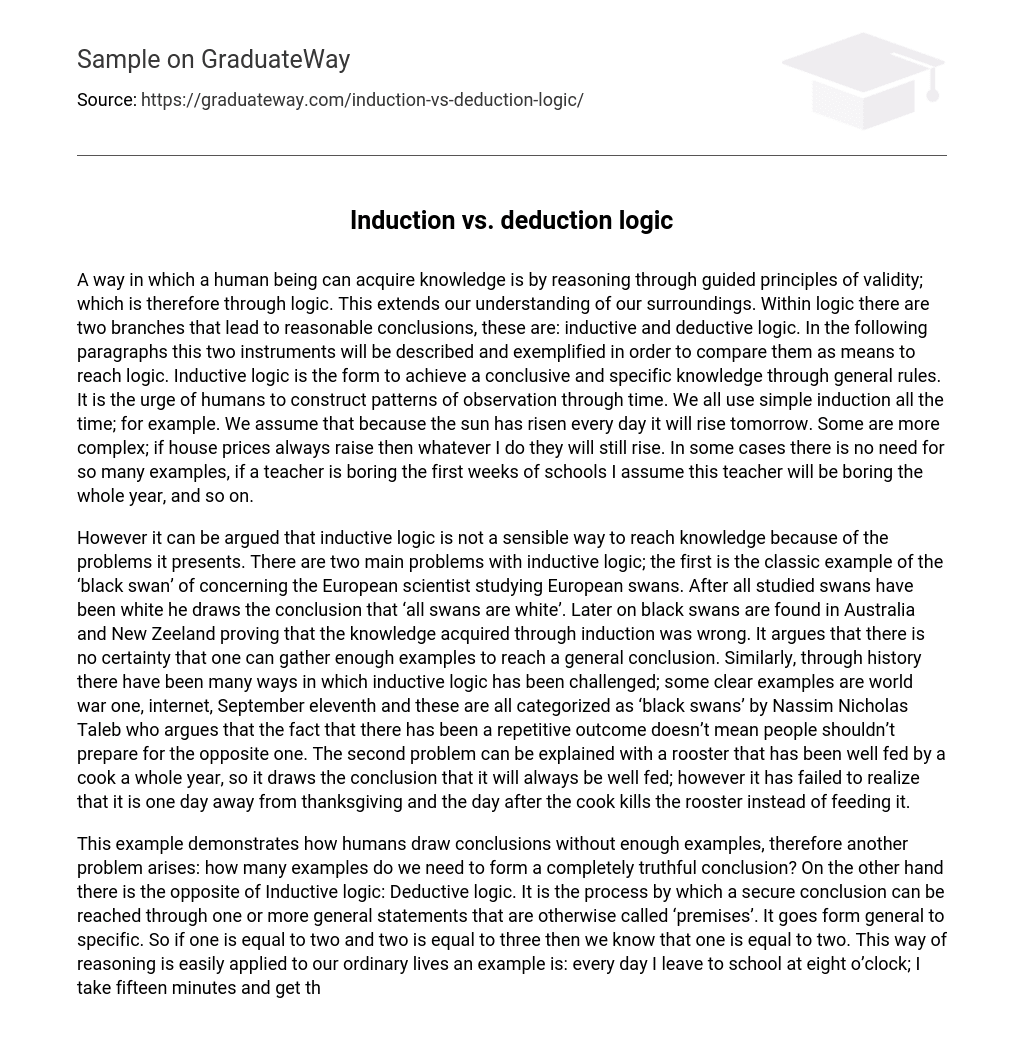Humans acquire knowledge through reasoning using guided principles of validity, known as logic. Logic helps us understand our surroundings and has two branches: inductive and deductive logic.
Inductive logic allows us to obtain specific knowledge by applying general rules. It involves creating patterns of observation over time. We often use simple induction, such as assuming the sun will rise tomorrow because it has risen every day. Complex examples include assuming that house prices always rise regardless of our actions. Sometimes, we can draw conclusions without multiple examples; for example, if a teacher is boring in the first weeks of school, we assume they will be boring throughout the year.
Inductive logic is often regarded as an unreliable method of acquiring knowledge due to its inherent problems. There are two main concerns associated with inductive reasoning. The first issue can be illustrated by the famous example of the ‘black swan’. In this scenario, a European scientist examines European swans and concludes that all swans are white based solely on observing white ones. Nevertheless, this belief is falsified when black swans are discovered in Australia and New Zealand. This example demonstrates that information obtained through induction does not guarantee certainty or provide sufficient evidence for reaching a general conclusion. Throughout history, various events such as world war one, the internet, and September eleventh have challenged the validity of inductive logic. Nassim Nicholas Taleb refers to these occurrences as ‘black swans’ and argues that individuals should prepare for contrary outcomes even if they appear repetitive.
The second problem with inductive logic can be exemplified by a well-fed rooster assuming it will always receive food because a cook has consistently fed it for a year. However, the rooster fails to recognize that Thanksgiving is approaching; instead of being fed, it will be slaughtered by the cook.
This text explores the concept of drawing conclusions with limited examples and raises questions about the number of examples needed for accuracy. It also introduces Deductive logic, which uses general statements called ‘premises’ to reach a secure conclusion. Unlike Inductive reasoning, which moves from specific to general, Deductive logic moves from general to specific.
For instance, if we have the statements “one equals two” and “two equals three”, we can logically infer that “one equals three”. This type of reasoning is commonly seen in everyday situations like following a daily schedule or predicting success based on past performance.
However, Deductive logic also has limitations similar to Inductive reasoning. The premises used in deductive arguments are either based on observations or assumptions, which brings us back to the concerns raised earlier.
In addition, a deductive argument can be invalid rather than false. A classic example is the statement that cats are mammals and cats can be pets. However, this does not imply that all mammals can be pets.
Despite the existence of non-cat mammals that cannot be kept as pets, accepting the validity of the argument in question compels us to acknowledge that proving a deductive argument’s conclusion requires establishing the truth of its premises. Induction, on the other hand, predicts future outcomes based on past examples, while deduction proves present or past truths by building upon previously validated truths. Personally, I find deductive logic more effective because if the premises are unquestionably true, we can be certain of a truthful conclusion. In contrast, inductive logic always carries doubt due to a lack of an exhaustive set of examples. It is worth noting though that induction relies on tangible examples whereas deduction can be founded on abstract ideas. Moreover, both types of logic rely to some extent on faith, underscoring how even rational thinking demands faith for knowledge acquisition.





